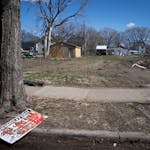 See
more of the story
See
more of the story
Mike Quinn broke in and trained new Minneapolis cops back in the 1980s. They were mostly young and idealistic, eager to be in a job where they could serve the community. But they were also aware of an often suspect public and the notion that bad cops exist.
"When rookies came into the department they always said they wanted to be an ethical cop," said Quinn, author of "Walking With The Devil," a book about the police code of silence. "They asked how they would know which cops are ethical. I told them that the ethical cops will find you."
In those young men and women, Quinn could often spot the ones who had potential, the ones who would rise above the rest. One of those was Medaria Arradondo, the person who looks to be the next Minneapolis police chief.
"He always had compassion for people," said Quinn, a longtime critic of police misbehavior who teaches courses to officers on peer intervention. "He's speaking from the heart. He's not trying to [B.S.] people. You can't ask for any more than that. I'm truly grateful he is being considered for chief."
Arradondo, or "Rondo" as he's fondly called, was unanimously approved by the City Council's public safety committee Wednesday. It was a remarkable meeting at a time of great conflict between the police and the community.
One by one, seasoned protesters and vocal critics of the city's blue line got up to praise and endorse Arradondo, from the Rev. Jerry McAfee, pastor of the New Salem Missionary Baptist Church, to members of police associations.
It was one of the few genuinely hopeful moments in the recent history of relations between police and the public, but it was also a moment as tenuous as the next questionable police action or protest.
Mayor Betsy Hodges, whose political future looked even shakier after last month's police shooting of Justine Ruszczyk Damond and subsequent resignation of former Chief Janeé Harteau, praised Arradondo's "calm and steady demeanor." She noted that Arradondo once sued the department for discrimination, then stayed.
"He could have taken that settlement and walked away, but he did not," Hodges said. "He believed in the MPD's ability to do better. He also stayed to show other African-American officers that there is a path ... to success."
Hodges had made a quick and forceful choice for the next chief, and she was rewarded with loud applause.
Arradondo's speech was short and impromptu. The most important thing he said was that he understands he's accountable, not just to the department's 855 officers, but also to the city's 400,000 citizens.
"Conflict and tension are not necessarily bad things," he said. "Oftentimes they come from voices that absolutely want us to do better."
Quinn says Arradondo walks a razor's edge.
"If [a chief] really pushes to be beloved, the good cops tend to think you're not dealing with the bad cops," he said.
Quinn has some unsolicited advice for Rondo. The first is to change how internal affairs works, or more accurately, doesn't work.
"Internal affairs has been a gatekeeper," Quinn said. "They just stall" on complaints until they go away.
He thinks Arradondo, along with Hodges, did the right thing by immediately addressing body camera rules. Cops who don't turn on their body cameras when responding to a call now face discipline.
"If cops don't have their cameras on, it's because it's tolerated by their supervisors," Quinn said. "Having the cameras on eliminates this idea of a cop being a snitch. It frees up the good cops. They really want to intervene, but they didn't think they'd get support from the administration."
Quinn said cops are let off the hook on unauthorized shootings because of the difference between legal standards and community standards.
"It's costing us legitimacy and it's costing us money," he said. "If you don't fear for your life as an officer, you aren't paying attention, but we can't use that to justify every shooting. I think Rondo sees what the community accepts from cops."
That's a pretty good start. But Arradondo will soon find he needs to play bad cop once in a while, and that will be unpopular to some. If he's approved as chief, which is highly likely, being a good guy will not be enough. He will also become something he probably never foresaw: a politician.
Arradondo will no longer be just the popular street cop from the neighborhood; he'll be the commander of more than 800 officers, all with varying degrees of skills and morals. The behavior of those individuals, for better or worse, will reflect on him.
The Rev. Brian Herron of Zion Baptist Church summed it up:
"It does no good to put Rondo in as chief if he's not going to be supported," Herron said. "He can't do it alone."
No, he can't. But Arradondo seems to have the one thing that is needed more than anything else right now, and that is trust.
jtevlin@startribune.com 612-673-1702
Follow Jon on Twitter: @jontevlin






